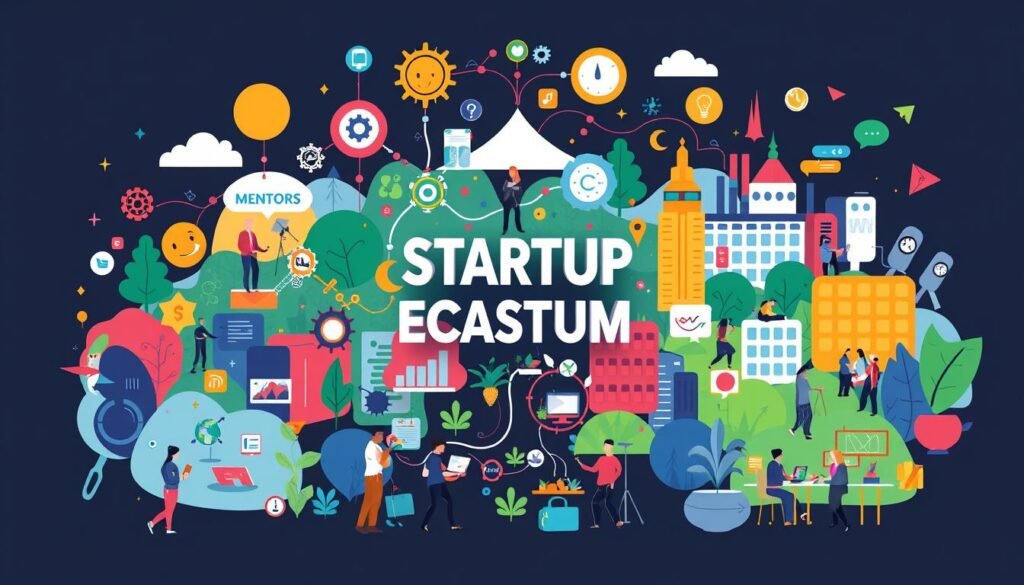Startup ecosystems are key for new businesses to do well. They offer resources, funding, and support. This helps entrepreneurs start and grow their ventures. If you’re starting a business or investing in startups, knowing how to build and keep a strong ecosystem is vital.
Places like Silicon Valley show how important these ecosystems are. They bring together investors, accelerators, and workspaces. This helps new businesses grow. Entrepreneurs can use these resources to make their startups more successful.
This article will look at what makes startup ecosystems work. We’ll cover the key parts and how to keep them strong. It’s important for both new and experienced entrepreneurs to understand these hubs. They are key to success in the startup world.
Table of Contents
Understanding Startup Ecosystems
A startup ecosystem is a network of elements that help new businesses grow and succeed. These ecosystems are key to economic growth, adding nearly $3 trillion in value worldwide. They create most new jobs, especially in areas where old industries are losing jobs.
What is a Startup Ecosystem?
A startup ecosystem is a network of people, organizations, and businesses working together. They create an environment for startups to launch and grow. Research shows that people, especially founders, are crucial for local economies.
Key Components of a Thriving Ecosystem
A thriving startup ecosystem has several key parts:
- Startups and entrepreneurs
- Educational institutions
- Incubators and accelerators
- Investors and funding organizations
- Support organizations (e.g., legal, accounting, and consulting firms)
- Private sector individuals (e.g., mentors, advisors, and domain experts)
These parts work together for the ecosystem to grow and thrive. The Global Startup Ecosystem Report (GSER) ranks the best and emerging ecosystems. It looks at things like ecosystem value and funding growth.
| Top 10 Global Startup Ecosystems (2022) | Rank |
|---|---|
| Silicon Valley | 1 |
| New York City | 2 |
| London | 2 |
| Boston | 4 |
| Beijing | 5 |
| Los Angeles | 6 |
| Tel Aviv | 7 |
| Shanghai | 8 |
| Seattle | 9 |
| Seoul | 10 |
While Silicon Valley is a top example, other ecosystems are also growing and showing their strengths.

Startup Ecosystems
The startup world is full of different places, like Silicon Valley. It also includes new places like Bali, Lisbon, and Greece. These places all aim to draw in talent, encourage new ideas, and offer what startups need to succeed.
Knowing what makes each startup place special helps new entrepreneurs pick the best spot for their business. These places offer more than just money and space. They build a community based on working together, learning from each other, and sharing goals.
Places like Silicon Valley, New York City, Singapore, and Tel Aviv are known for their startup success. They draw in people, money, and resources from all over. But, new places are also becoming important for startups.
The global startup economy is worth $3 trillion, showing how powerful these ecosystems are. They give entrepreneurs the tools, connections, and support they need. By learning about these ecosystems, new founders can move forward with more confidence and aim to build lasting and meaningful businesses.
Benefits of Startup Ecosystems
Startup ecosystems bring many benefits, not just for startups but also for the local community, economy, and workforce. They create a place where innovation and entrepreneurship thrive. This leads to growth and prosperity for the area.
For the Local Community and Economy
A strong startup ecosystem can change the local community and economy for the better. It leads to more jobs and brings in investment money. This money helps governments improve infrastructure and services.
It also makes the area more attractive, bringing in more economic growth. This can raise the standard of living for locals.
For Startups
Startups in a strong ecosystem get lots of help and resources. They can get tax breaks, shared workspaces, and access to skilled workers. There are also funding groups and investors, incubators, and places for networking and getting advice.
This support helps startups succeed and grow. It makes the ecosystem stronger overall.
For Workers
People looking for jobs in a startup ecosystem have a lot to gain. They can find stable jobs, grow in their careers, and work in a place that values innovation. The area’s lively culture and amenities also make life better for workers.

Startup ecosystems help with ecosystem benefits, economic development, and talent attraction. They make the local community, economy, and workforce better. These hubs are key to growth and success.
Building a Successful Startup Ecosystem
To build a thriving startup ecosystem, you need a strategic plan. This plan should look at the local environment and set clear goals. By knowing what your region is good at and where it needs work, you can make an ecosystem that meets your community’s needs. This approach helps ensure success over time.
Assessing the Local Environment
First, look at the local business scene, the people living there, and what resources are available. Find out what your area is already good at, what industries it has, and where it could grow. This ecosystem building check-up shows you what to focus on and develop.
Setting Goals and Objectives
After your environment assessment, set big but reachable goals for your startup ecosystem. These goals might include drawing in digital nomads, supporting a sector like tech or healthcare, or encouraging innovation and entrepreneurship. Clear goal-setting will direct your work and help keep the ecosystem strong for the future.
| Startup Ecosystem Maturity Stages | Key Characteristics |
|---|---|
| Activation | Emergence of new startups, strengthening community ties, and balancing ecosystem functions. |
| Globalization | Increased international connections, attracting talent and investment from abroad. |
| Attraction | Ecosystem becomes a magnet for startups, talent, and investment, recognized as an innovation hub. |
| Integration | Ecosystem is deeply integrated into the global startup landscape, with strong support structures and continued growth. |
By planning and acting on ecosystem building, communities can make a place that encourages innovation, entrepreneurship, and growth. It’s key to match the ecosystem with the local community’s needs and potential for success and sustainability.

Key Resources for Entrepreneurs
Aspiring entrepreneurs can find many resources to help them succeed. These include funding organizations, investors, incubators, accelerators, and networking chances. These tools offer support, guidance, and connections for new businesses.
Funding Organizations and Investors
Getting startup funding is key to success. Entrepreneurs can look into angel investors, venture capitalists, and government initiatives for grants and support. These options can give the money needed for growth and development.
Incubators, Accelerators, and Coworking Spaces
Incubators and accelerators can change the game for startups. They offer mentorship, guidance, training, and a community for entrepreneurs to grow faster. Coworking spaces also help startups by offering a place to network and share ideas.
Networking and Mentorship Opportunities
Networking is crucial for entrepreneurs. Industry events, entrepreneurial communities, and mentors give valuable insights and support. These resources help startups face challenges, make changes, and reach their goals.
| Location | Startup Resources |
|---|---|
| Houston, TX | 470+ Accelerators, Incubators, Investors, and more |
| South Carolina | 100+ Accelerators, Incubators, Investors, and more |
| Pittsburgh, PA | 500+ Accelerators, Incubators, Investors, and more |
| Georgia | 240+ Accelerators, Incubators, Investors, and more |
| Cameroon | 140+ Accelerators, Incubators, Investors, and more |
By using these resources, entrepreneurs can move through the startup world with more confidence. This can help them build successful, lasting businesses.

Conclusion
Starting a new business can be tough but also very rewarding. Knowing how a startup ecosystem works, its benefits, and how to build a strong one helps entrepreneurs succeed. They can find important resources like money and advice, and use networking and mentorship to their advantage.
The Global Startup Ecosystem Index 2024 shows how startup scenes are changing. They’re becoming more local and less global, and government support is key for startups to grow. With new areas like AI, healthtech, and blockchain becoming big, entrepreneurs need to keep up and be quick to spot new chances.
Entrepreneurs who know what makes a startup ecosystem work well and use its resources can boost their success chances. This is true for both new and experienced founders. Getting into the ecosystem’s fast-paced world can help you reach your goals and make a difference in your community and the world.



